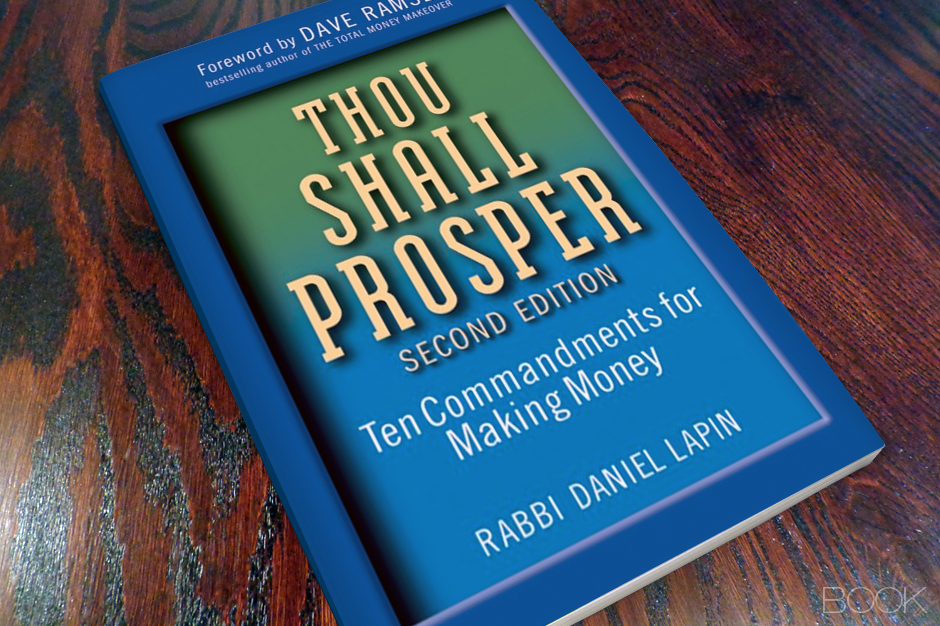Thou Shall Prosper

Money is a great way to measure if you’re a valuable human being. That’s my controversial one line summary of Rabbi Daniel Lapin’s book, Thou Shall Prosper.
Why I read this book
I have been going through as many of Dave Ramsey’s “library” recommendations as possible, and Thou Shall Prosper has been on my reading list for at least 3 years. The title alone is intriguing, but it’s usually refreshing to get a different cultural perspective on a familiar topic. I’m not sure how closely Rabbi Lapin’s thoughts on money align with Jewish culture at large, but he definitely gives fresh perspective.
The substance
Rabbi Lapin uses ten chapters to give ten commandments for making money. Some chapters are more “rich” than others, but all were worthwhile. This book is very philosophical (the author would say spiritual) but it is also highly practical. At the end of each chapter, there are bullet point steps to take to fulfill the money making commandment. The major philosophical argument is that business gets a horrible wrap from the world at large, specifically the media and those with socialistic political views. Rabbi Lapin makes an effective case that not only is business not bad, but it is the very epitome of goodness, something valuable. How is business so good? Simply because business transactions always involve at least two parties who voluntarily exchange one resource for another. When those exchanges are made, it makes at least those two parties better off than they were before. There are times when there is a winner and a loser in a transaction, but most times there are multiple winners. Everyone is often better off when exchanges, or trades, happen. Rabbi Lapin says most people don’t succeed in business because their minds and hearts won’t allow them to, because we’ve been conditioned to believe business is evil.
YOU are in business
Before you start thinking this is only a book for business owners, hear this plea from Rabbi Lapin:
Almost everyone is in business. You have your time, skills, experience, personality, and some other attributes to market. You have customers, clients, supervisors, employers, associates, bosses, or patients to please. You many not realize it, but you probably even have a board of directors. It consists of you as chairperson, perhaps your spouse, and maybe some of your trusted friends with whom you discuss your professional career. These people are also unpaid members of the board of You, Inc.
That’s an empowering idea if you can live like you are the CEO and President of You, Inc.\ Not only that, but it may be one of the most secure ideas you ever let your mind chew on. Because if You, Inc. has one customer generating revenue (your employer), then that puts You, Inc. in a very precarious position. If anything disrupts that one “customer” of You, Inc., all of You, Inc. could be going under. The alternative is to diversify You, Inc.’s prospects a bit and take more control over your life and money as opposed to leaning heavily or entirely on an employer. This book gave me a few different nuggets like that which shifted my thinking.
A distorted view of money
My biggest knock on Thou Shall Prosper is the book’s tendency to elevate money to a very high status. Like dangerously high. However, Rabbi Lapin would classify my concerns as part of the negative conditioning this world has laid on business and money. But as I examine my own experience and Christian Scripture, particularly the Gospels, I don’t see money as having a primary, or even a secondary, role in discovering the fullness of life we believe God created us for. Granted, Rabbi Lapin doesn’t have the Gospels of Christ as part of his Holy texts. But I do, and I think Jesus’s words and life give us the greatest example of how to realize full life and complete joy. The view of money espoused is simply too high. Instead, I think a neutral money philosophy is the key. Money is not an ends and it is not good in itself, but it is also not evil. Rabbi Lapin does point to an intense focus on serving and creating value for people as the road to monetary prosperity. And even encourages to not treat people as a means to material wealth. But despite those admonitions, the book does elevate money above people. The good news is that under this philosophy, even if someone’s end goal is to accumulate as much wealth as possible, they will have to treat people really well and create a lot of value for other people to get there. As for you and me, I believe we have to relentlessly emphasize that money, time, and our other gifts are all given to serve and love people. And merely using people to enhance our money, time, or other gifts will always leave us discontent. Finally, Rabbi Lapin does very little to reassure those who have chosen to serve others with their lives and not be monetarily rewarded. The most obvious example in my life is Sara, my wife, who has chosen to dedicate her time serving her husband and children by doing full-time homemaking. Another example as the numerous folks who volunteer their efforts and take significantly reduced salaries to do work they love or feel is valuable. In all of those cases, Rabbi Lapin’s money philosophy belittles those who have sacrificed in such ways. Money is not the best way to measure the value of a human, or human productivity.
Recommendation
I recommend Thou Shall Prosper, but not in isolation. I believe someone whose primary money philosophy is taken from the pages of this book will not clearly see how God designed us to use the resources and economies of this world. Get other perspectives, particularly from the Bible and then test them for yourself.